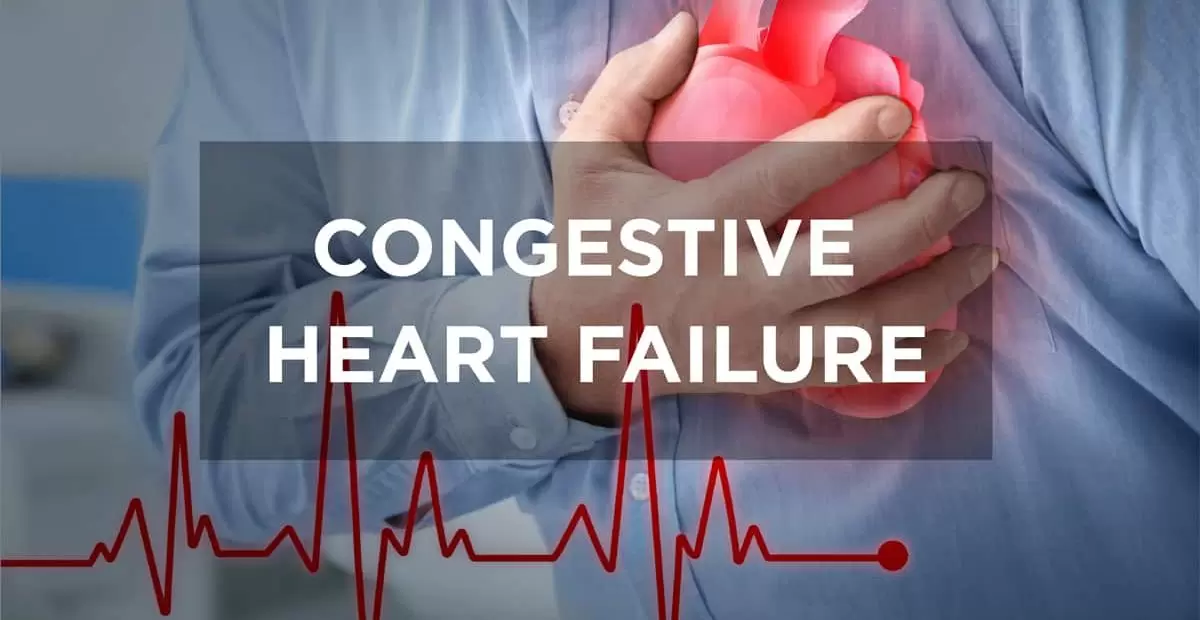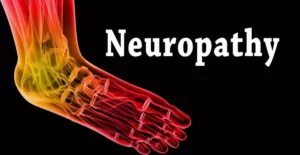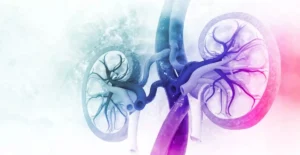Congestive Heart Failure is when the heart muscles weaken and work slowly. The heart cannot pump blood effectively as it works in normal conditions. It does not mean that the heart stops working. Its working slows down due to weak cardiac muscles.
Imagine your heart struggling like a tired superhero, unable to pump enough blood to keep your body strong and energized. That’s what happens in congestive heart failure. Understanding how it happens and how to care for your heart can make you the hero in this story. Let’s discover and learn more.
A healthy and normal heart functions efficiently. It has four chambers and all take part in pumping blood effectively. But in this condition, cardiac muscles contract due to weakness. Many people are diagnosed with this condition with their symptoms. This is a process that leads to congestive heart failure and is about to stop or slow your heart.
Causes Lead to Congestive Heart Failure
Many factors become the cause of congestive heart failure. Heart failure leads to the slowing down of your heart. Here are a few causes of congestive heart failure:
Coronary Artery Disease (CAD)
The coronary artery supplies oxygenated blood from the lungs to the heart. But in (CAD) your arteries are blocked with plaque or blood clots, narrowing the arteries. It prevents the heart from oxygen and blood supply. As a consequence, heart muscles become weak and its function slows down.
Heart Attack
A heart attack is quite different from a heart failure. A sudden blockage of an artery or heart wall becomes the cause of cardiac muscle damage. It suddenly stops the blood supply to the heart leading to a heart attack.
Cardiomyopathy
The muscles of a heart are called cardiac muscles. Use of alcohol, smoking, drugs, infection, and certain gene changes damage the cardiac muscles. It prevents the heart from pumping blood efficiently which becomes the cause of a heart attack.
Obesity
Obesity is the cause of being overweight. Fatty acid layers accumulate around the heart muscles which render the pumping of blood or these fats stuck in the arteries or veins. So obesity also becomes the cause of a heart attack or heart failure.
Heart Stressors
Sometimes, many problems together become the cause of congestive heart failure. Blood pressure, Hypertension, Diabetes Mellitus, Thyroid issues, severe kidney problems, Breathing issues, and other heart problems become the main causes of heart failure.
Symptoms of Congestive Heart Failure
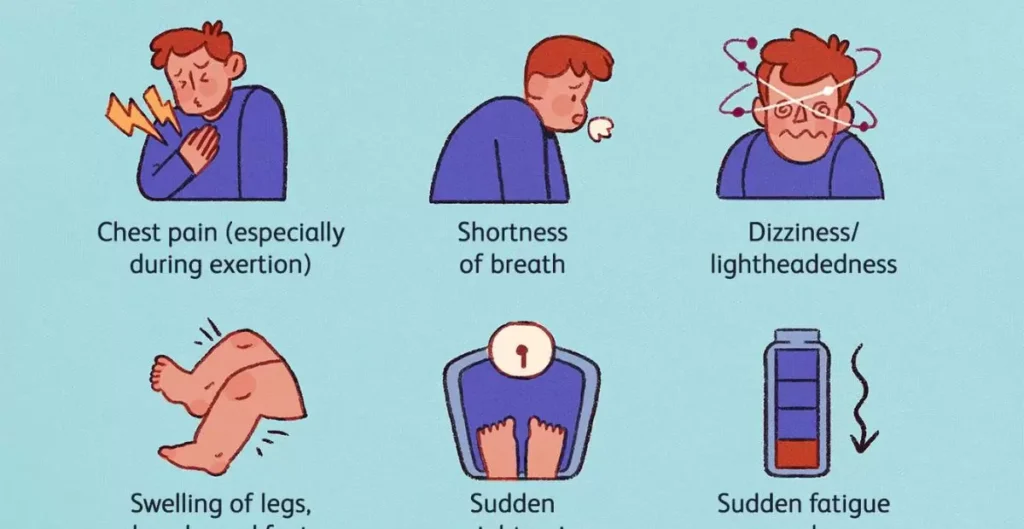
Many severe and mild factors affect your daily life directly or indirectly. Sometimes, you might not show any symptoms regarding heart failure but a sudden blockage of the heart or artery affects your life severely and may lead to the cause of your death. These symptoms are maybe mild as:
- Fatigue
- Fast heartbeat rate
- Shortness of breath
- Continuous Coughing
- Weak cardiac muscles
Sometimes few symptoms may be severe enough that it leads to congestive heart failure. These are the main factors that cause other serious issues related to mental health, digestive problems, urinary issues, and being overweight. These factors are:
- More urination
- Unconsciousness
- Low appetite
- Nausea
- Heavyweight
- Weakness
- Muscle fatigue
- Chest pain
Different Health Conditions
It is essential to understand other related problems of health conditions. Different health conditions have a clear call to stop or block your heart functions. These are:
Systolic Heart Failure
In this condition, heart muscles become weak and work slowly. So the cardiac muscles can not pump blood efficiently around the whole body.
Heart Attack
As a result of the blockage of the coronary artery due to a blood clot that is stuck in it, you are falling into a condition that is called a heart attack. This is a sudden attack that stops the blood supply to the heart. Heart muscles are damaged or weakening due to the shortage of oxygen and blood to the heart. This causes severe pain and this sudden condition is called a heart attack.
Cardiac arrest
The condition in which blood circulation and the heart stop working and nerve impulses are too slow. This condition is called cardiac arrest. If immediate treatment is not required, the person may die due to this condition.
Treatments
Treating congestive heart failure is like giving your heart a superhero makeover! Doctors may prescribe medications.
Medications
- Diuretics to remove excess fluid
- ACE inhibitors to relax blood vessels
- Beta-blockers to ease strain on the heart
- Controlling blood pressure
- Managing cholesterol level
Special devices like pacemakers and defibrillators can sometimes help in maintaining a strong heartbeat. Furthermore, recollect that solid propensities like eating right, remaining dynamic, and following your physician’s instructions are fundamental for a blissful heart.
Surgery
Surgery is essential in serious conditions like open heart and bypass block arteries or replacement of heart valves. A pacing therapy or biventricular pacemaker is required for such patients having the chance of long-term heart failure. The last stage of the congestive heart failure is heart transplantation. It works like a healthy person with a success rate of 88 percent for one year with high care.
Diagnosis
Rheumatoid arthritis is a condition that causes joint pain and swelling. Various factors are involved in the diagnosis of congestive heart failure or the treatment of heart failure. These factors or steps are essential for managing the symptoms and improving the quality of life for individuals with rheumatoid arthritis.
1. Medical History
Your doctor will be checking your previous medical reports, all recognized symptoms, and other related issues for heart disease.
2. Physical Examination
Your complete physical examination helps the doctor to acknowledge the clear symptoms of heart failure such as your abnormal heart condition, and slow pumping of blood.
3. Diagnostic Tests
Blood Tests: The blood tests indicate the factors of heart failure like B-type natriuretic peptide (BNP) or raised levels of other specific hormones.
Imaging Tests: These are some special tests to diagnose the symptoms of congestive heart failure. These tests include echocardiography or (Ultrasound), X-ray techniques, and MRI to get detailed and clear images of the heart related to its structure and function.
Electrocardiogram (ECG or EKG): This type of test is used to get a graph of regular heartbeat rate through the heart’s electrical activity that shows heart condition.
Stress Test: A stress test Measures heart function during physical activity. It reveals all limitations and abnormalities related to heart functioning.
Cardiac Catheterization: In this test, a fine tube is injected into the heart to examine blood circulation and pressure. It helps to diagnose body health.
4. Monitoring
Regular monitoring is necessary to understand sleep, and heart functioning over time. Daily monitoring or check-ups help to improve your health.
5. Collaboration
Diagnosis involves collaboration among physicians, primary doctors, specialists, and cardiologists. They all provide inclusive evaluation and precise diagnosis.
By joining these developments, doctors diagnose congestive heart failure effectively and provide customized treatment plans to administrate the diseases and improve healthy life.
Prevention and Management of Congestive Heart Failure
Prevention and management of congestive heart failure is important for a super healthy life. There are some crucial points to improve your quality of life.
Healthy Lifestyle
Manage a balanced rich diet such as fruits, vegetables, protein-rich food, and whole grains with pulses. Maintain the level of glucose, fats, cholesterol, and sodium range.
Regular Exercise
Make a schedule for 30 minutes of exercise mostly in a week as your doctor prescribed. Regular exercise keeps you fit and healthy.
Manage Risk Factors
Manage your blood pressure, diabetes, and high cholesterol levels by medication, dieting, and a good lifestyle. The higher levels of these factors are always chronic and sometimes become the main cause of congestive heart failure.
Quit Smoking
Smoking is always lethal not only for heart patients but also has toxic effects on normal people. It affects the heart and blood vessels, increasing the chance of congestive heart failure.
Limit Alcohol Intake
Excessive Alcohol weakens the heart muscles. It is very harmful and has lethal effects for heart patients. Say goodbye to alcohol consumption.
Medication Adherence
Manage your symptoms as directed by your physician and hinder the health problems through referred medication.
Regular Check-ups
Monitor routine check-ups for effective functioning of the heart and treatment accordingly.
Weight Management
A healthy weight is crucial to maintaining a heart condition. Discuss your healthy weight ambitions with your doctor.
Stress Management
Stress management techniques are beneficial to lowering your stress level. These techniques may be strong inhalation, speculation, and staying captivated by your hobbies.
Fluid and Salt Intake
Control fluid and salt intake in a balanced way because excessive use of minerals or salts may lead to heart failure. Manage salt and fluid considerations according to the prescription of your doctor. Patients can improve their quality of life and alleviate the risk of health problems by following these preventive measures and management.
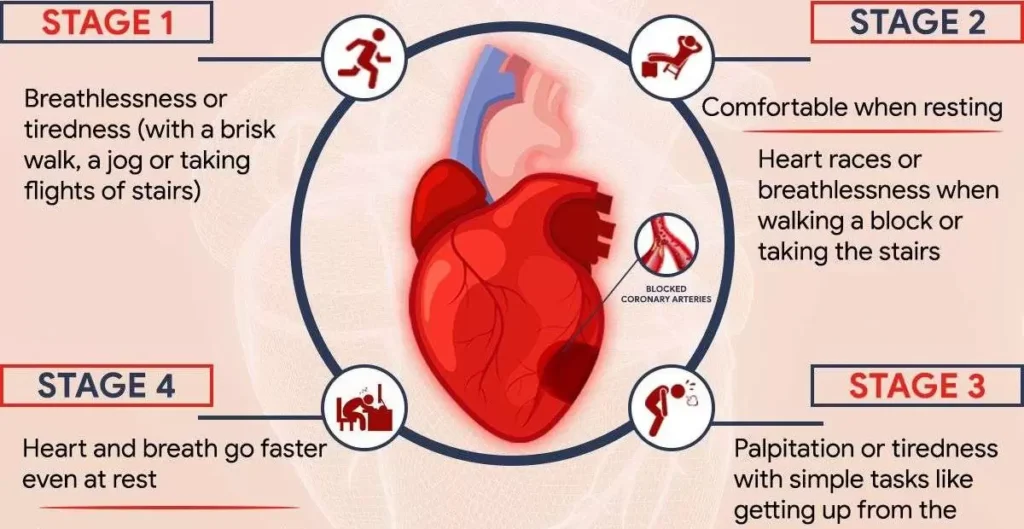
FAQs
What are the 4 stages of heart failure?
There 4 stages of heart failure, stage A, stage B, stage C, and stage D identified by researchers. These can be recognized at the C or D stage by your physician because these stages show maximum no of severe symptoms of heart failure.
What is the best treatment for heart failure?
Regular meditations are the best treatment for heart failure. It can be considered an easy and quick source of treatment when used regularly.
Can heart failure be cured completely?
No, it does not have a complete cure. Heart failure can be treated or regulated by different methods like medication or physical exercise. It can maintain your health and keep you like an active and healthy person.
How long can a person live with heart failure?
In recent research, it is estimated that half of the people suffering from congestive heart failure live approximately 5 years after diagnosis.
Conclusion
All things considered, the congestive cardiovascular breakdown is a troublesome condition that can in a general sense influence one’s very own fulfillment. It routinely happens when the heart becomes crippled or hurt, regularly in light of fundamental conditions, for instance, coronary stock course disease, hypertension, or past cardiovascular issues. Medicine to reinforce the heart, dietary changes to decrease sodium admission and liquid maintenance, and individualized practice programs.
Sometimes careful intercessions like heart transfers or implantable gadgets are possibilities for treatment. A heart-sound way of life, including a decent eating regimen, ordinary activity, and abstaining from smoking and extreme liquor utilization, can fundamentally diminish the gamble of creating congestive cardiovascular breakdown. For effective management, regular checkups and screenings are essential for early diagnosis.

